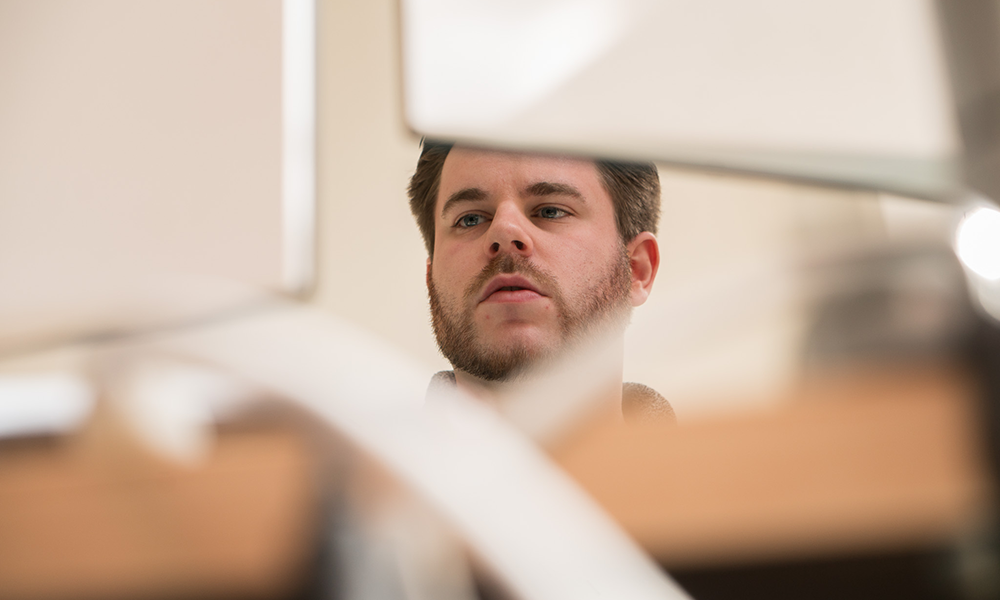Student spotlight: Robert MacKnight
Lauren Smith
Feb 27, 2024

Drawn by sports statistics, Robert MacKnight was interested in numbers and mathematics from a young age. It started him on a path toward engineering.
Now a Ph.D. student in chemical engineering, MacKnight chose the field when he became more aware of environmental concerns. "I'm interested in how we can reinvent processes and chemicals so that the world can be more sustainable and its inhabitants can be healthier," he says. "There's a whole host of unexplored chemical processes and compounds that we hesitate to optimize, often deterred by factors like high costs, extensive time requirements, or other prohibitive challenges."
This year, MacKnight was selected for a Presidential Fellowship at Carnegie Mellon. He has also received support and training from the National Science Foundation's Center for Computer Assisted Synthesis (CCAS). The center brings together research groups across universities. "Together, we have a powerful platform for addressing problems in chemistry using machine learning," he says.
MacKnight takes inspiration from the process of discovering molecules and the new approach of using machine learning to drive that discovery.
We need ways to speed up and automate the processes that make up these sorts of discoveries.
Robert MacKnight, Ph.D. student, Chemical Engineering
He researches data-driven methods for understanding chemical reactivity, specifically for small molecules. "I started off learning how to use computational methods to model molecules by themselves and also in the presence of other molecules. I wanted to get an idea of how reactivity works and the effect of catalysts," he explains. "On that level, you're able to understand a lot about whether things are favorable from an energy standpoint."
Working with Gabe Gomes, MacKnight uses machine learning methods to bridge from what we can calculate about a molecule to what we observe from experiments.
The Gomes Group is interested in artificial intelligence (AI) in large language models (LLMs). Among other projects, MacKnight is building an agent to study molecules with computational methods and then use machine learning to associate them with experimental objectives. "I'm trying to make an artificial intelligence that does what I do every day in research, which is a bit strange," he says.
MacKnight is motivated by the potential of AI to accelerate tasks and save researchers from the daily grind of belaboring code and wondering where to move next when an experiment doesn't go as expected. This applies to the search for new materials, like those in pharmaceuticals and batteries. "We need to come up with ways to speed up and automate the processes that make up these sorts of discoveries, to understand the theory, to observe it via experiments, and then to scale up," he says.
MacKnight is also involved in the development of Coscientist, a system that uses LLMs to autonomously design, plan, and execute experiments based on a plain-language prompt. MacKnight designed the software module allowing Coscientist to search technical documentation. Published in Nature, the findings demonstrate that AI systems are versatile, efficient, and trackable in advancing scientific research. The Gomes Group also emphasizes the need to address safety implications.
MacKnight is deliberative about the benefits and risks of artificial intelligence. He sees the current moment as a turning point and advocates for an emphasis on safety measures. "Although AI is scaling at a speed that no one thought of, I don't think it's too late," he says. "As a scientific community, we should be building risk aversion strategies in parallel to developing the technology."
Last summer, MacKnight worked as part of the evaluation team at OpenAI, coming up with ways to evaluate their models for different tasks. The experience has helped him think more deeply about the safety of models in the chemistry domain and how to evaluate them at different stages.
In November, MacKnight traveled to Basel, Switzerland, to represent the Gomes Group at the Society for Laboratory Automation and Screening Data Sciences and AI Symposium. MacKnight presented on the development of Coscientist. "It was an audience that I wouldn't really get staying in Pittsburgh," he says. The international connections he made on the trip have helped him to gain perspective from both industry professionals and academics on how the field has progressed in the past year.
These experiences, in combination with computer science and machine learning courses at CMU, are valuable preparation for MacKnight. He would like to work for a company at the forefront of the tech industry after completing his Ph.D.
For media inquiries, please contact Lauren Smith at lsmith2@andrew.cmu.edu.
